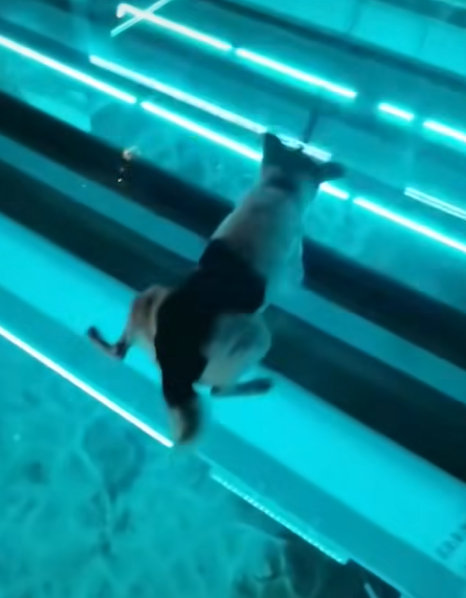An adorable bulldog puppy named Tuna underwent a much-needed facelift to improve her breathing at night. The one-year-old pup had to undergo the first of many surgeries to address health issues related to the extreme breeding practices she has been subjected to. The RSPCA is using her story as a cautionary tale against breeding pets to have flat faces. While Tuna still has some medical procedures in her future, she is currently receiving care at the Blackberry Farm Animal Centre in Aylesbury, Buckinghamshire.

The adorable one-year-old puppy named Tuna (shown in the photo before her surgery) recently underwent the first of several necessary procedures to improve her quality of life, after facing numerous health challenges.

Tuna, the adorable puppy in the photo after her surgery, is currently under the care of the organization at Blackberry Farm Animal Centre in Aylesbury, Buckinghamshire. The animal welfare group has cautioned that Tuna’s life will always be challenging and restricted.
According to vet nurse Katherine Maling, Tuna is not your typical energetic puppy. She easily gets tired and finds it hard to enjoy walks or playtime. While other puppies were attending training and socialization classes, Tuna was spending her early days at the vet undergoing x-rays.
Katherine expressed disbelief at the fact that Tuna has to go through so much just to breathe. She criticized the breeding of dogs to have such health issues and stated that it should not be considered normal. Despite these challenges, the team is hopeful that Tuna will eventually lead a more typical life, and they are committed to ensuring her comfort and happiness.


The RSPCA has used Tuna’s story as a cautionary tale against breeding pets with flattened faces. The adorable puppy, shown in photos before and after a procedure, was rescued by the RSPCA last September. Tuna had been snoring loudly, struggling to breathe due to excess skin around her nose known as ‘the rope’, which was causing skin issues. She also had eyelid surgery to address drooping caused by the weight of her face. Next on the agenda is a surgery to help her breathe better by widening her nostrils and removing excess tissue from her soft palate. Tuna, only 14 months old, has already undergone extensive surgeries totaling thousands of pounds.

Tuna’s photo was taken before she underwent surgery. The extra skin around her nose, also called ‘the rope’, was causing discomfort and potential infections due to soreness and hot spots. Fortunately, she was able to receive treatment from a specialized vet, although these procedures can be very intricate and costly.
Dr. Samantha Gaines, an expert in dog welfare from the RSPCA, has criticized the emphasis on pets’ appearance, which has led to the adoption of unhealthy breeding techniques. She expressed concern that the desire for “cute” features has resulted in breeders selecting dogs with flatter faces, causing respiratory issues in certain breeds and denying them the ability to engage in normal activities like playing, exercising, or sleeping comfortably.
These dogs are vulnerable to various health problems, such as skin infections, allergies, eye issues, and back pain due to their unique features. Dr. Gaines stressed that while these breeds are beloved by many, it is unethical to prioritize physical characteristics that can harm their well-being. It is time to stop supporting breeding practices that compromise the health, behavior, and overall welfare of these animals.




